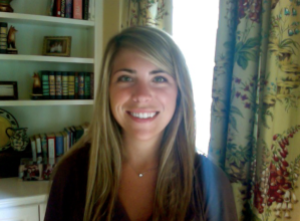Dana Westerkam was entering her final year at Davidson College in Fall 2011, and like many college students, she’d had the notion that Wikipedia was a disreputable source. But, the South Carolina native says, she always felt like Wikipedia had the potential to be great, especially in the area of psychology, her field of study. So she was excited to learn that her Cognitive Psychology class, taught by Dr. Greta Munger, was participating in the Wikipedia Education Program, and that she’d be writing a Wikipedia article for class.

With classmate Emily Matiak, Dana chose to work on the article on confabulation, a cognitive psychology article that was missing some key elements. Dana really enjoyed the work.
“It had a lot of the same feel as a traditional assignment. For example, both require the same process of acquiring research. However, the actual writing in the Wikipedia assignment allowed for much more creativity and flexibility. Students can add neat pictures that aid in their explanations and decide the layout of the page,” Dana says. “Especially as a senior in college, it was refreshing to do something different that allowed me to get creative.”
She enjoyed the assignment so much that she was excited to take a senior capstone class with Dr. Munger in Spring 2012, the History and Systems in Psychology. Dana worked alone to improve the article on insight, which she had noticed was lacking in references.
Dana’s Online Ambassador, Smallman12q, provided excellent feedback and guidance as she improved the insight article.
“I would post on his talk page, and he was extremely prompt and helpful in his responses. It helped a lot,” Dana says. “I have been extremely encouraged by the community of editors. Everyone seems ready to help each other and contribute to this Wikipedia overhaul together. Several editors have even provided me with helpful feedback for improvements, as well as guidance on how to do certain formatting issues.”
Learning wiki markup was the hardest part of the assignment for Dana, but she says she figured it out, and is confident others can, too. The downsides of learning the technology were far outweighed by having her college work published on Wikipedia.
“My favorite part was being able to show my parents what I was working on in school. Parents frequently call with the question, ‘You learning anything in school? What have you been working on?'” Dana says. “It is so boring to email them a 12-page research paper. I loved being able to say, ‘Mom and Dad, Google “confabulation” or “insight”. See that Wikipedia page that pops up… I wrote that!'”
Dana graduated from Davidson this spring and is applying to medical school. She hopes to have more opportunities to use Wikipedia as a teaching tool in the future.
“I would love to encourage other schools and professors to get involved with the project,” she says. “As a student, it is so cool to see your work published online and to know that your information will be read by many, not just yourself and your professor. It makes you feel like your work has more of a purpose than just for a grade.”
— LiAnna Davis, Wikipedia Education Program Communications Manager

Can you help us translate this article?
In order for this article to reach as many people as possible we would like your help. Can you translate this article to get the message out?
Start translation